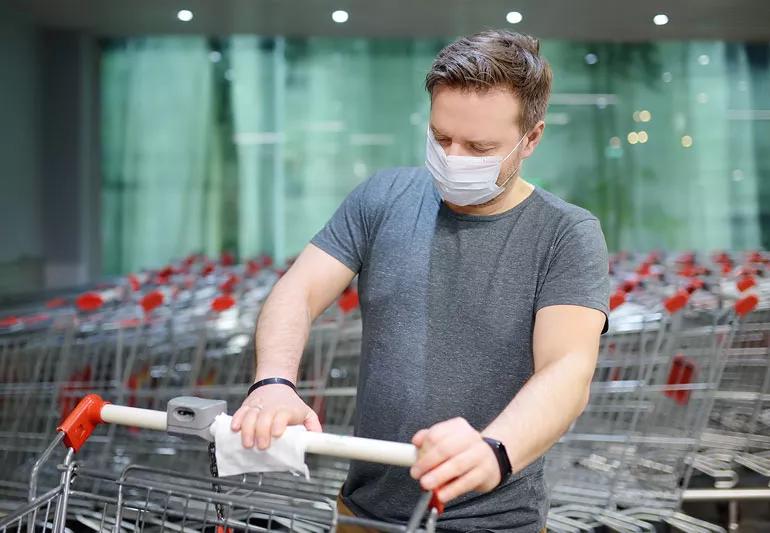Wearing gloves doesn’t give you perfect protection against COVID-19

Image content: This image is available to view online.
View image online (https://assets.clevelandclinic.org/transform/c849ee57-a01a-4218-be2d-1103393d0011/storeMaskNoGloves-1212921608-770x533-1_jpg)
Man at grocery store with mask and no gloves
As the novel coronavirus (COVID-19) continues to spread, so do tips and advice on how you can protect yourself. Plus with the Centers for Disease Control (CDC) now recommending face masks during essential trips (like going to the grocery store or pharmacy), you might be wondering if wearing gloves is a logical precaution.
Advertisement
Cleveland Clinic is a non-profit academic medical center. Advertising on our site helps support our mission. We do not endorse non-Cleveland Clinic products or services. Policy
“We’re seeing a lot of people out in public wearing gloves, which isn’t wrong so to say,” says infectious disease specialist Alan Taege, MD. “But unfortunately most people aren’t wearing or disposing of their gloves correctly, which defeats the whole purpose.”
There are many factors that play into why gloves aren’t always an effective protection measure outside of direct patient care. There could be a tear or rip in the gloves, you could put them on or take them off incorrectly, but most importantly, the gloves could give you a false sense of security – and you end up touching everything you please, including your face, leading to self-contamination.
The glove itself is only good protection if the person wearing it follows good protective measures, but unfortunately, most people will not.
Instead, Dr. Taege recommends that your best bet is to go to the store without gloves and follow these steps:
Advertisement
“Social distancing, not touching your face, sanitizing your hands after you’re done shopping, followed by washing your hands is a reasonable approach to avoid acquiring the virus in the store,” explains Dr. Taege.
Gloves do not give you immunity nor permission to touch everything within reach either. Any germs that might be on your gloves can be transferred to all other surfaces and items you touch. This is why it’s counterproductive to wear gloves, yet continue to rummage through your purse or text on your phone while in the store.
The coronavirus can enter your body through mucous membranes, like in your nose and mouth. It does not enter your body through your hands, but the hands can transport the viral particles to the mucus membranes. There’s even the possibility that the virus could stick to the latex in gloves better than it could adhere to your own skin.
Still, for those who swear by gloves, it’s important to avoid cross-contamination when wearing them, otherwise they offer you no protection. It’s also critical to follow the CDC’s recommendation on how to correctly remove them.
“Many people don’t take off their gloves the right way, further contaminating themselves and others around them,” says Dr. Taege. “And you should never, ever reuse gloves.”
In case you’re unfamiliar, here’s a quick recap of how to safely remove your gloves:
Advertisement

Sign up for our Health Essentials emails for expert guidance on nutrition, fitness, sleep, skin care and more.
Learn more about our editorial process.
Advertisement
If you've had COVID-19, you may think you don't need to be vaccinated. Think again.
Don't lose sight of the other health threats children face
The short answer from experts
The short answer from an infectious disease specialist
Here’s how to shop safely
The short answer from an infectious disease specialist
Safety protocols for donation amid coronavirus
Most recommended precautions center around minimizing bruising or swelling
Type 2 diabetes isn’t inevitable with these dietary changes
Applying a hot or cold compress can help with pain
Pump up your iron intake with foods like tuna, tofu and turkey